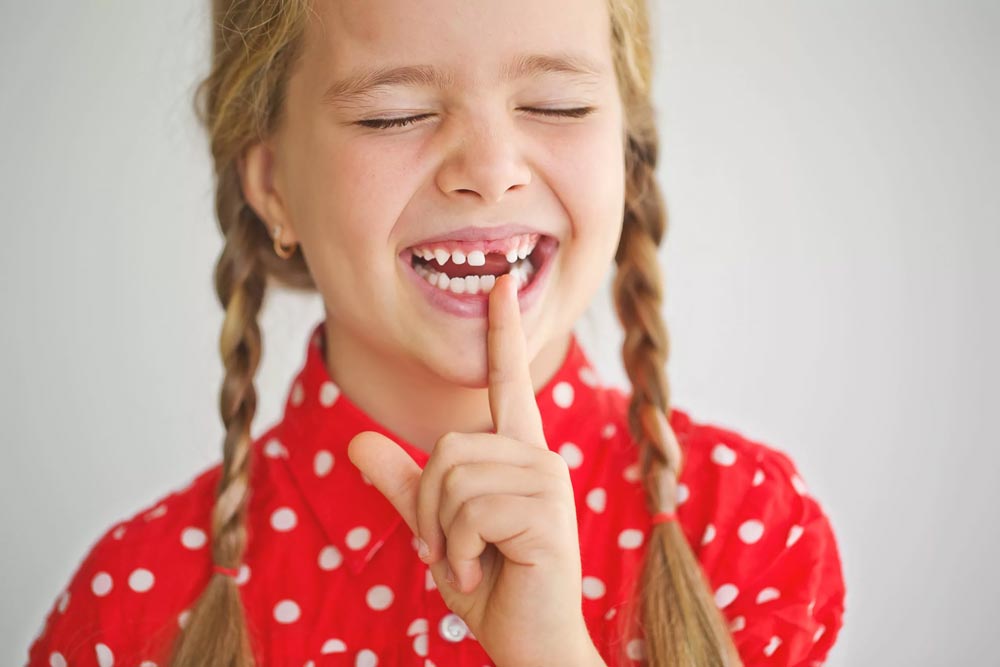
It Takes Years to Lose All 20 Baby Teeth
As a child grows up, there are a host of milestones that every parent and child can both celebrate. From taking their first step to speaking their first words, young children experience many accomplishments in the early years of their lives. One of these milestones happens to be when a child starts losing baby teeth. While it can be a mildly painful process, young children celebrate losing baby teeth. After all, it doesn’t happen all at once and occurs over a few years. Additionally, they are often school age at this time. Many of their peers are going through the same process, as well. They can share their experience and celebrate each other’s accomplishments.
Losing baby teeth is a big moment for a child, as it signals that they are growing up. However, your child will lose many baby teeth before their permanent adult teeth emerge. It can be a confusing time for a child. Some losses aren’t painless, and no parent wants to see their little one hurt. While we all know about the tooth fairy, what else should you do when your child is losing baby teeth?
Losing baby teeth is a big step in the development of young children. It’s one of the major keep indicators of your child’s growth. While it is an exciting time, it also means some changes are happening. Many parents may wonder what they should do during this time. Cosmetic & Family Dentistry of Las Colinas understands the importance and excitement of losing baby teeth, and we are here to help.
How Do Baby Teeth Fall Out?
Your child’s baby teeth will first erupt when they are around six months old. All 20 of their baby teeth will come in by the time they are between 2-3 years old. On average, most children start to lose their baby teeth by the time they are 6-7 years old, but they can begin losing them earlier. They will start losing baby teeth to make way for their permanent teeth. These teeth typically fall out in the same order that they came in, beginning with the lower center row. However, that isn’t always the case.
Baby teeth start getting lose when permanent teeth, also called secondary teeth, start pushing on them when they are ready to erupt. A baby tooth won’t loosen until a permanent tooth starts pushing it out of the socket. As the permanent tooth pushes up from underneath the gumline, it destroys the anchoring root for the baby tooth. As this root deteriorates, the primary tooth loosens more and more. This process can take several weeks and even months. As long as there is no redness, swelling, or other additional irritation, it is best to let these teeth fall out on their own.
Can We Speed up the Process?
We know for many kids wiggly, loose teeth may be annoying. However, it is best if you let the tooth fall out on its own. You can tell your child to wiggle their loose tooth gently to speed up the process, but you should not pull it out. When you pull it out too soon, you break the root, which leaves the space more vulnerable to bacteria and infection, threatening your child’s dental health. It can even cause pain and bleeding. However, if a loose tooth remains in the socket for several months, bring your child to the dentist. It may need to be professionally pulled.
Teeth usually fall out on their own by getting stuck in food. If a tooth is extremely loose, virtually hanging on by a thread, you can take a tissue and try to rotate the tooth until it pops out. In some rare cases, a child will swallow their tooth, but you do not need to worry. It will pass like everything else.
What to Do After a Tooth Is Lost
As a parent, you should inform your child that after a tooth has fallen out, they may feel some tingling and some light bleeding. This is normal. Many children won’t experience bleeding if they let their teeth fall out on their own. However, remind your child that the pain and blood will go away shortly. Have them rinse their mouth with water. Then place gauze or a damp towel in their mouth to ease pain and stop bleeding. If pain continues, you can use over-the-counter medication, such as Ibuprofen, or an oral anesthetic.
You must remember that a lost baby tooth will not be replaced by a permanent tooth immediately. It typically takes several weeks for a permanent tooth to replace a baby tooth. Your child will likely have a gap in their teeth that they can show off to their friends. When the secondary tooth comes in, you may notice a few things. First, the tooth will have pronounced ridges when they first erupt, but over time, chewing will wear them smooth. Additionally, these teeth will be less white than baby teeth, which is normal.
Most notably, your child’s new teeth will look super-sized in their mouth. These adult teeth are fully formed and will remain this size their whole life. Your child will grow into them in due time.
Things to Know
Losing baby teeth is a natural part of life. All children go through this process. While they won’t lose their teeth at the same rate as each other, they will all eventually lose them. Outside of the topics we discussed already, there are a few more things all parents should know about losing baby teeth:
- Prepare for some teething pain: Your child may experience pain that travels along their jaw to the back of the mouth. Typically, this pain is the result of their molars emerging. These can be painful since they aren’t replacing any baby teeth. Ice water or popsicles can help, as well as child ibuprofen.
- Expect teething to be a long time: It took years for your child’s baby teeth to grow in, and it will take years for their permanent teeth to erupt. Their first molars emerge when they are around six, followed by their second molars at about 12 years old, and then their wisdom teeth grow between 17 and 21 years old.
- There is no timetable: The general rule of thumb is that four teeth will erupt every six months. However, this isn’t exact. Some children lose their teeth faster than others. The rate at which teeth fall out and grow in is not always consistent.
- Care for baby teeth: Even though they will lose their baby teeth, they still need to take care of them. These teeth have many purposes. They reserve space for permanent teeth, give their face shape, help with speech, and help with nutrition. Decayed baby teeth can damage developing permanent teeth. Children should still brush twice a day and floss daily, and they are not too young for a dental cleaning.
Schedule a Dental Exam
When your child begins losing their teeth, you should still bring them to the dentist to ensure that their permanent teeth grow correctly. Additionally, if you believe your child is having problems with losing their teeth too soon or too late, contact Cosmetic & Family Dentistry of Las Colinas and let us help care for your child’s teeth.
- Awareness16
- Bad Breath1
- Bone Grafting1
- Braces4
- Causes, Symptoms, And Treatments6
- Cavities5
- Chewing Gum1
- Cosmetic Dentistry of Las Colinas15
- COVID-192
- Deep Cleaning7
- Dental Anxiety1
- Dental Bridge2
- Dental Care27
- Dental Cleaning6
- Dental Crown1
- Dental Filling1
- Dental Health24
- Dental Implants6
- Dental Sedation1
- Dental Visit1
- Dental X Ray3
- Floss1
- Gum Dieseases4
- Injury1
- Insurance1
- Invisalign8
- Oral Cancer1
- Oral Hygiene24
- Root Canal9
- Sleep Apnea2
- Tartar1
- Teeth19
- Thanksgiving1
- TMJ1
- Tongue1
- Veneers2
- White Teeth12
Get Your Best Smile With Us
